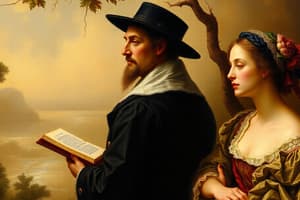Podcast
Questions and Answers
Which approach to literary study focuses primarily on the text's form and structure?
Which approach to literary study focuses primarily on the text's form and structure?
- Historical Criticism
- Marxist Criticism
- Biographical Criticism
- Formalism (correct)
What does Psychological Criticism primarily investigate?
What does Psychological Criticism primarily investigate?
- Gender roles in literature
- Social and political contexts of the literature
- Psychological motivations of characters and authors (correct)
- Historical influences on the author
Which literary approach examines how gender dynamics are presented in a literary work?
Which literary approach examines how gender dynamics are presented in a literary work?
- Marxist Criticism
- Biographical Criticism
- Feminist Criticism (correct)
- Formalism
How does Historical Criticism differ from other literary approaches?
How does Historical Criticism differ from other literary approaches?
What is one of the key benefits of engaging with literature?
What is one of the key benefits of engaging with literature?
What is the primary purpose of studying literature?
What is the primary purpose of studying literature?
Which of the following genres is NOT classified as fiction?
Which of the following genres is NOT classified as fiction?
What are the key elements of a plot?
What are the key elements of a plot?
How does setting influence a literary work?
How does setting influence a literary work?
Which of the following describes poetry?
Which of the following describes poetry?
Which narrative perspective is characterized as 'third person omniscient'?
Which narrative perspective is characterized as 'third person omniscient'?
What makes non-fiction distinct from fiction?
What makes non-fiction distinct from fiction?
Which aspect is included in a writer's style?
Which aspect is included in a writer's style?
Flashcards
Formalism
Formalism
This approach focuses on the text's form, structure, and language, analyzing its artistic qualities and self-contained nature.
Historical Criticism
Historical Criticism
This approach examines the social, cultural, and political contexts surrounding a literary work.
Psychological Criticism
Psychological Criticism
This approach explores the psychological motivations of characters and authors within the text.
Feminist Criticism
Feminist Criticism
Signup and view all the flashcards
Marxist Criticism
Marxist Criticism
Signup and view all the flashcards
Plot
Plot
Signup and view all the flashcards
Characters
Characters
Signup and view all the flashcards
Setting
Setting
Signup and view all the flashcards
Theme
Theme
Signup and view all the flashcards
Style
Style
Signup and view all the flashcards
Point of View
Point of View
Signup and view all the flashcards
Poetry
Poetry
Signup and view all the flashcards
Non-fiction
Non-fiction
Signup and view all the flashcards
Study Notes
Introduction to Literature
- Literature encompasses a broad range of written works, including novels, poems, plays, short stories, essays, and more.
- It is often categorized by genre (e.g., science fiction, romance, historical fiction) and by historical period.
- Literature serves various purposes, including entertainment, the exploration of human experience, and the investigation of social and political issues.
- Studying literature involves analyzing the text's themes, characters, plot, style, and language.
- Literary analysis often explores the interactions between authors, readers, and the wider social and cultural contexts.
Types of Literature
- Poetry: A literary work characterized by aesthetic excellence in language, form, and imagery. Often utilizes rhythm, rhyme, and figurative language. Subgenres include sonnets, haikus, ballads, and free verse.
- Drama: A form of literature intended for theatrical performance. It includes dialogue, stage directions, and characters. Subgenres include tragedy, comedy, and melodrama.
- Fiction: A genre of literature that depicts invented or imagined events and characters. Examples include novels, short stories, and novellas. Fiction can explore a wide range of themes and perspectives.
- Non-fiction: A genre of literature that presents factual accounts of events, experiences, or ideas. Examples include biographies, autobiographies, historical accounts, and essays. Often aims to inform rather than entertain.
Elements of Literary Analysis
- Plot: The sequence of events in a narrative. Key elements include exposition, rising action, climax, falling action, and resolution.
- Characters: The individuals who drive the plot. Analysis often focuses on character motivation, development, and relationships.
- Setting: The time and place in which the story occurs. Setting can deeply affect the story's atmosphere and themes.
- Theme: The central idea or message explored in a literary work. Themes are often complex and multifaceted, and may be directly or indirectly expressed.
- Style: The author's distinctive way of communicating ideas and creating an effect on the reader. Includes aspects such as diction, imagery, and figurative language.
- Point of View: The perspective from which the story is told (e.g., first person, third person limited, third person omniscient). Point of view affects the reader's understanding of events and characters.
Approaches to Literary Study
- Formalism: Focuses on the literary text itself, analyzing its form, structure, and language. It prioritizes the text's artistry and self-contained nature.
- Historical Criticism: Examines the social, cultural, and political contexts in which a literary work was created. It considers the historical influences on the author and the intended audience.
- Biographical Criticism: Analyzes the life and experiences of the author to understand how their background might have influenced their writing.
- Psychological Criticism: Investigates the psychological motivations of characters and authors in relation to the text.
- Feminist Criticism: Examines how gender roles, stereotypes, and power dynamics are portrayed in literature and how they impact the experience of female characters.
- Marxist Criticism: Examines literature based on class struggle and economic systems, focusing on how class influences the text.
Importance of Literature
- Provides insights into human nature and experience.
- Encourages empathy and understanding for various perspectives and circumstances.
- Allows for exploration of social and political issues in a complex and nuanced manner.
- Develops critical thinking skills through analysis and interpretation.
- Enhances language skills through close reading and engagement.
- Offers cultural and historical context.
Studying That Suits You
Use AI to generate personalized quizzes and flashcards to suit your learning preferences.




